tohle kopnout, tak mě klepne pepina 
Beautiful torques found by 59-year-old metal detectorist
Categories: Treasures
Maurice Richdson, after forty years of searching, found a magnificent torques, the price of which has climbed to £350,000. But bad weather could have put a damper on everything...
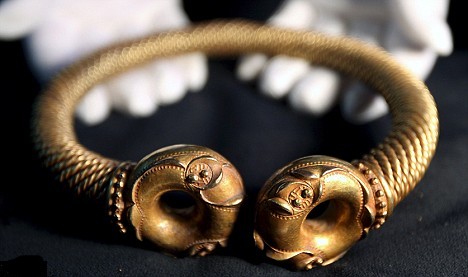
For forty years, Maurice Richardson has been on a regular search with his metal detector in almost every kind of weather. Thanks to his persistence, at 59 he has finally found a 2,000-year-old treasure. It's a gold torques, worth £350,000.
Scientists at the British Museum have described it as one of the most valuable Iron Age finds. In particular, the perfectly executed craftsmanship has raised suspicions as to whether it is a fake. Subsequent research, however, confirmed that the torques found were genuine.
"The detector started to give a signal, but as it was raining a lot, I thought I would skip digging this time. However, I kept wondering what might be underground. Finally, I gave up and started digging. After a while I came across an object, so I knelt down and started digging with my hands. At that moment, I had no idea that there was a golden torques hidden under the layer of dirt. When you read about finds like this, you secretly dream that you might be among the chosen. When I finally removed the jewel from the ground, I was simply amazed. I didn't think about money at that moment," said Maurice Richardson.
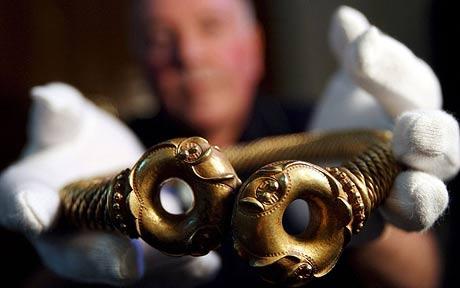
Torques is similar to other jewels of its kind found in Europe. In appearance, it resembles a large necklace that was discovered in the UK in the 1950s. This similarly declares the great skill of the craftsmen of the first half of the first century BC. It is one of the most elaborate pieces of ancient jewellery. In all that time, neither Roman, Greek nor Chinese precious objects have been able to match it.
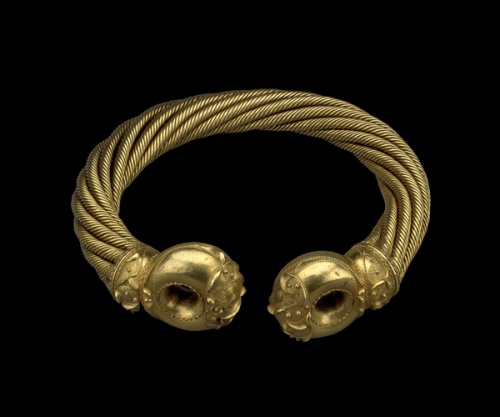
This large necklace is the big brother of the one found by Maurice Richardson. It was made with one kilogram of gold and silver. In total, the construction contains 64 threads, one of which measures 1.9 mm. These are gathered in eight bundles to create a perfect visual effect. This large torques was buried around 75 BC. It is currently housed in the British Museum.
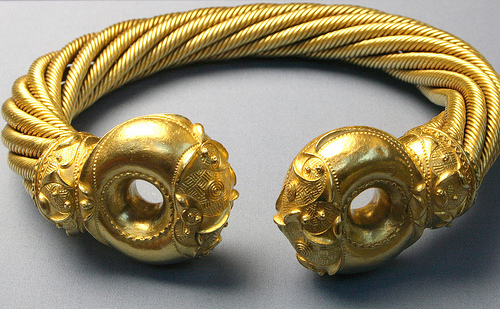
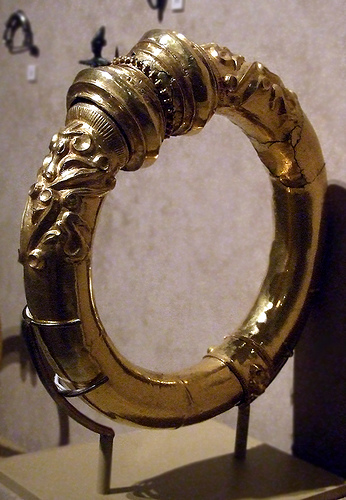
Torques were worn only by the most powerful women and men in Celtic Britain. It was sometimes placed on statues of the gods. It was popular with both Celtic and Roman dignitaries. It was made of bronze and gold, sometimes silver and iron.
You want to find some treasure, too? Check out our metal detectors.
The article is included in categories:
Post
Mně už vezou....  Parádní úlovek.
Parádní úlovek.
Jj nedávno o těhlech nákrčnicích dávali na History dokument ,páráda
Krásná řemeslnická práce 
Už mi tam něco nechte  ,jinak moc pěkné
,jinak moc pěkné  .Sen každého hledače
.Sen každého hledače 
TO bych se neprobral z toho 
Tak to je paráda taky bych chtěl něco najít 
Neveril bych, kdybych kopnul zlatý torques 
Je to nádhera, krásná řemeslná práce a nález který se podaří jednou za život. 
Moc pěkné to je nález snů 
… třeba ho ztratila Keltská rebelka Boudica z kmene Icenu je o tom i film Warrior Queen Boudica 
Zlatá dobrá Anglie,tam se toho bude nacházet dost ještě za tisíc let.Nepojedem tam? 
Jó,jó, Anglií šly dějiny... Ale abych tady nevzlykal,u nás šly taky. A tak není vyloučeno,že by něco podobného mohlo někde ležet i u nás! A vo vo tom to je! 
Životní nález , snad se jednou také zadaří , něco podobného kopnout. 
jenom bych se p....l 
To je tak nadherne, ze bych to archeologum prines do muzea jen ukazat a pak se s tim jeste mesic mazlil doma , nez bych jim ho odevzdal.  )))
)))
Krásná práce velice unikátní provedení. Gratulace.
Podle starých map byla určitě větší část Čech osídlena Kelty než začaly migrovat po celé Evropě
takže tady musí někde něco být.Jen na to přijít.
to najíz tak se zblázním 
Tomu se říká ůlovek..to najít tak budu létat jako ten orel..  Kelti tu byly takže na nás taky někde čeká.. Zítra se po něm půjdu mrknout
Kelti tu byly takže na nás taky někde čeká.. Zítra se po něm půjdu mrknout 


Frajer, už jen, že to ustál... Mě by kleplo!!!
To je nádhera, málem jsem se poslintal.






























